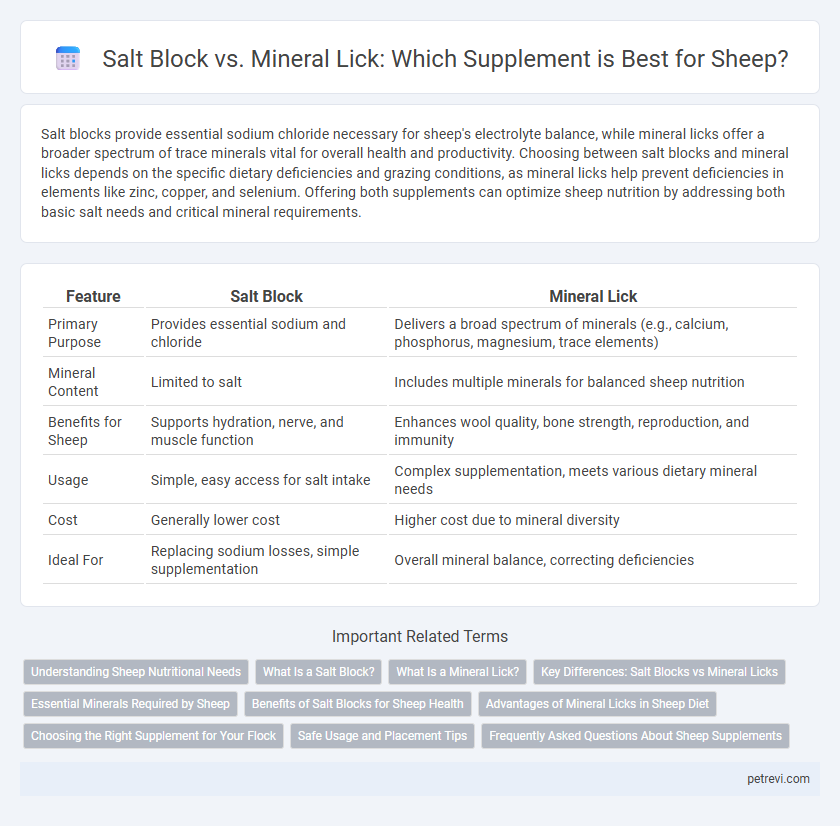Salt blocks provide essential sodium chloride necessary for sheep's electrolyte balance, while mineral licks offer a broader spectrum of trace minerals vital for overall health and productivity. Choosing between salt blocks and mineral licks depends on the specific dietary deficiencies and grazing conditions, as mineral licks help prevent deficiencies in elements like zinc, copper, and selenium. Offering both supplements can optimize sheep nutrition by addressing both basic salt needs and critical mineral requirements.
Table of Comparison
| Feature | Salt Block | Mineral Lick |
|---|---|---|
| Primary Purpose | Provides essential sodium and chloride | Delivers a broad spectrum of minerals (e.g., calcium, phosphorus, magnesium, trace elements) |
| Mineral Content | Limited to salt | Includes multiple minerals for balanced sheep nutrition |
| Benefits for Sheep | Supports hydration, nerve, and muscle function | Enhances wool quality, bone strength, reproduction, and immunity |
| Usage | Simple, easy access for salt intake | Complex supplementation, meets various dietary mineral needs |
| Cost | Generally lower cost | Higher cost due to mineral diversity |
| Ideal For | Replacing sodium losses, simple supplementation | Overall mineral balance, correcting deficiencies |
Understanding Sheep Nutritional Needs
Sheep require essential minerals such as sodium, calcium, phosphorus, and trace elements like zinc and selenium for optimal health and wool production. Salt blocks primarily provide sodium chloride, while mineral licks offer a broader spectrum of vital nutrients tailored to address specific deficiencies in sheep diets. Selecting the appropriate supplement depends on the flock's nutritional requirements, forage quality, and existing mineral imbalances to ensure balanced nutrient intake and prevent metabolic disorders.
What Is a Salt Block?
A salt block is a solidified form of sodium chloride designed to provide essential salt supplementation to sheep, helping regulate their fluid balance and nerve function. These blocks often contain added trace minerals like zinc, copper, and selenium, which are crucial for sheep's immune system and overall health. Salt blocks are durable, weather-resistant, and allow sheep to self-regulate their intake based on their physiological needs.
What Is a Mineral Lick?
A mineral lick is a specially formulated supplement containing a blend of essential minerals such as calcium, phosphorus, magnesium, and trace elements like copper and zinc, designed to support sheep health and productivity. Unlike plain salt blocks that provide primarily sodium chloride, mineral licks address broader nutritional deficiencies and improve metabolic functions vital for wool growth, reproduction, and immune response. Providing sheep with access to mineral licks helps prevent common mineral imbalances and enhances their overall vitality and performance.
Key Differences: Salt Blocks vs Mineral Licks
Salt blocks primarily provide sodium chloride essential for electrolyte balance and hydration in sheep, while mineral licks deliver a broader spectrum of vital minerals such as calcium, phosphorus, magnesium, and trace elements necessary for overall health and wool growth. Salt blocks typically have a simpler composition and are used mainly to encourage water intake, whereas mineral licks are formulated to correct specific nutritional deficiencies and support metabolic functions. Choosing between salt blocks and mineral licks depends on the specific dietary needs and mineral availability in the sheep's forage environment.
Essential Minerals Required by Sheep
Salt blocks primarily provide sodium and chloride, essential for maintaining fluid balance and nerve function in sheep, while mineral licks offer a broader range of vital nutrients such as calcium, phosphorus, magnesium, and trace elements like copper and zinc that are crucial for growth, reproduction, and wool quality. Sheep require a balanced intake of these minerals to prevent deficiencies that can lead to health issues such as poor immunity, skeletal problems, and decreased production. Using mineral licks alongside salt blocks ensures comprehensive mineral supplementation tailored to the specific dietary needs of sheep in various physiological stages.
Benefits of Salt Blocks for Sheep Health
Salt blocks provide essential sodium and chloride, crucial for regulating fluid balance and nerve function in sheep. They enhance feed digestion and improve wool quality by supporting metabolic processes. Regular access to salt blocks helps prevent mineral deficiencies, boosting overall sheep health and productivity.
Advantages of Mineral Licks in Sheep Diet
Mineral licks provide essential trace minerals such as zinc, copper, and selenium that are crucial for sheep growth, immune function, and reproduction, which plain salt blocks lack. These licks improve nutrient balance by addressing specific deficiencies in pasture-based diets, enhancing wool quality and overall health. Supplementing with mineral licks reduces the risk of metabolic disorders and supports optimal productivity in flock management.
Choosing the Right Supplement for Your Flock
Choosing the right supplement for your flock involves understanding the specific nutritional needs of sheep, where mineral licks provide a broad range of essential trace elements like copper, selenium, and zinc, critical for immune function and growth. Salt blocks primarily supply sodium and chloride but lack the comprehensive minerals found in mineral licks necessary to prevent deficiencies. Selecting mineral licks tailored to regional soil mineral profiles ensures optimal health and productivity in your flock.
Safe Usage and Placement Tips
Salt blocks and mineral licks provide essential nutrients for sheep, but proper usage ensures safety and effectiveness. Place salt blocks and mineral licks in dry, easily accessible areas away from water sources to prevent contamination and encourage regular intake. Regularly monitor block consumption to avoid over-supplementation, which can cause health issues like salt toxicity or mineral imbalances.
Frequently Asked Questions About Sheep Supplements
Salt blocks primarily provide sodium chloride essential for sheep's electrolyte balance, while mineral licks offer a broader spectrum of nutrients including calcium, phosphorus, and trace minerals vital for growth and reproduction. Sheep require different supplements depending on their diet and production stage; mineral licks ensure deficiencies are avoided by supplying essential macro and micro-minerals commonly lacking in forage. Understanding the specific nutrient composition of each supplement helps optimize sheep health, improve wool quality, and enhance overall productivity.
Salt Block vs Mineral Lick for Sheep Supplementation Infographic

 petrevi.com
petrevi.com